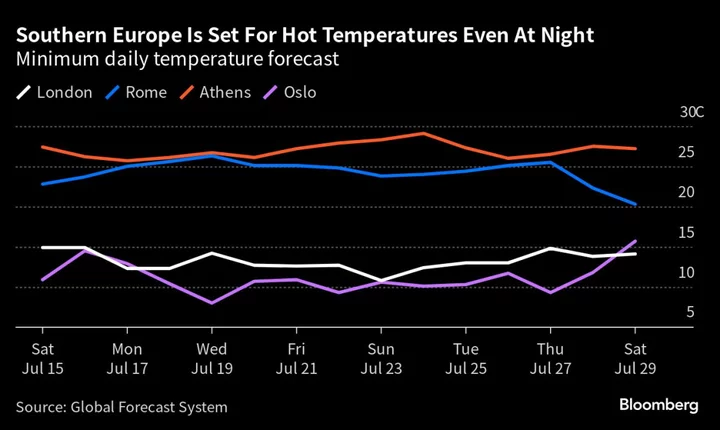Extreme heat is ripping through southern Europe and parts of Germany, with the next blast from the Sahara lifting temperatures toward record highs in parts of Italy this weekend.
In Athens, the nighttime temperature won’t drop below 25C (77F) for 15 days, while many of the city’s inhabitants are seeking relief on nearby beaches from as early as 6 a.m. Between midday and 5 p.m., the Greek authorities have halted delivery services, while the famed Acropolis will be shut for that period. Some tourists visiting the ancient site have needed first aid.
The Europe Space Agency has warned that the region’s all-time high of 48.8C is likely be tested this month on the Italian islands of Sicily and Sardinia. Climate change is increasing the frequency of extreme weather across the Northern Hemisphere, underlining the increasing urgency to cut greenhouse gas emissions, according to the World Meteorological Organization.
The extreme weather “is having a major impact on human health, ecosystems, economies, agriculture, energy and water supplies,” said WMO Secretary-General Petteri Taalas. “We have to step up efforts to help society adapt to what is unfortunately becoming the new normal.”
As Cerberus anticyclone fades, the next heat wave from North Africa named Charon — after the ferryman who delivered souls to the underworld in Greek mythology – will increase temperatures further over parts of Italy.
That’s prompting heat warnings across the nation’s cities. Italy’s transport Minister Matteo Salvini also made an executive order to curb a strike by train workers, citing the heat wave as the reason to intervene. The strike, which started early Thursday, was halved to 12 hours.
Hot weather is also continuing on the Iberian peninsula as Madrid approaches the record temperature of 42.7C set in August 2021. The Spanish capital is expected to reach 42.1C on July 18, according to Global Forecast System. Meanwhile, Berlin is set for temperatures above 35C on Saturday, the hottest so far this year, according to Bloomberg and Maxar Technologies Inc.
Read More: France Cuts Nuclear Output as Heat Triggers Water Restrictions
The heat is impacting transport and energy systems across the region. Electricite de France SA will curtail production at one nuclear reactor this weekend as the heat wave restricts the amount of water that can be discharged into the Rhone River. EDF uses water to cool its reactors before releasing it into the river, and overheating the waterway can threaten fish and other wildlife.
In Hungary, the Paks nuclear plant said on Thursday that it was reducing output after the temperature of Danube river, used for cooling, reached 29.7C.
The intense heat has brought a sharp divide across Europe, with the UK and the Nordics set to remain cooler than usual for this time of year.
Temperatures in Oslo will dip to 8C on July 19, according to GFS, while London will experience lows of 11C on Tuesday. Still, yellow wind warnings are in place for Friday and Saturday across many parts of the UK, as a deep area of low pressure affects the country.
--With assistance from Sotiris Nikas and Tommaso Ebhardt.

